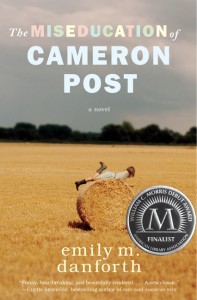 After Delaware’s Cape Henlopen School Board eliminated an entire summer reading list amidst controversy over a challenge to The Miseducation of Cameron Post, member organizations of the National Coalition Against Censorship decided to make lemonade from those lemons. CBLDF and seven other organizations that fight for free speech sponsored an essay contest encouraging Delaware high school students to read the book and tell school board members what they should have known about it before the vote. In honor of Banned Books Week, NCAC announced the three winners on Monday!
After Delaware’s Cape Henlopen School Board eliminated an entire summer reading list amidst controversy over a challenge to The Miseducation of Cameron Post, member organizations of the National Coalition Against Censorship decided to make lemonade from those lemons. CBLDF and seven other organizations that fight for free speech sponsored an essay contest encouraging Delaware high school students to read the book and tell school board members what they should have known about it before the vote. In honor of Banned Books Week, NCAC announced the three winners on Monday!
NCAC Executive Director Joan Bertin said the essays that poured in “showed that teenagers can be mature and thoughtful in their approach to books that some adults consider controversial and inappropriate.” The winners, Hannah Lowe, Katie Redefer, and Rachel Wagner, received cash prizes totaling $500 donated by Rob Spicer, the father of a gay Cape Henlopen graduate who vocally opposed the board’s action.
In her essay titled “The Miseducation of Cape Henlopen High School,” first place winner Hannah Lowe told the board that “teenagers do not appreciate our educations being turned into battlegrounds for opposing opinions, especially when we are never consulted or our voices heard.” She went on to point out the futility of trying to shield students from things that continue to exist in the real world even if a book is banned:
[C]lose-minded people leap into action to censor our literature, without realizing that we benefit from reading it, and that they cannot censor the world around us. All that censorship will provide is a lack of relatable literature.
Second place winner Katie Redefer stressed that positive representations in literature could literally make the difference between life and death for some students. Noting the high rate of suicide and attempted suicide among LGBT teens in the United States, she said:
A book such as this one being talked about in a friendly environment could surely help a homosexual student, as they might think ‘maybe being gay isn’t such a bad thing, all of the other students who read the book aren’t disgusted by Cameron being gay, so they might feel the same about me.’ One moment of realization that being gay isn’t a mortal sin could lead a suicidal student to getting the help they need, and one day accepting who they are as a person. If saving a student’s life isn’t a good enough reason for the school board to keep The Miseducation of Cameron Post on the reading list, then I don’t know what would be.
Third place winner Rachel Wagner criticized the school board for focussing on a few instances of profanity — the official explanation for the challenge — while ignoring the impact of the entire work:
If you were to strip out every ‘foul’ word, every sexual reference, every moment that makes you cringe – perhaps you would eliminate 10 pages of text. What of the other 460 pages of plot?
Literature is used to communicate- to help understand – to give to a reader what they might not have otherwise: the knowledge that someone else senses what they sense and feels what they feel.
Congratulations to these inspiring young writers! They and all of the students who entered the contest give us hope for the future. Check out the full text of the winning essays at NCAC’s website.
We need your help to keep fighting for the right to read! Help support CBLDF’s important First Amendment work by visiting the Rewards Zone, making a donation, or becoming a member of CBLDF!
Contributing Editor Maren Williams is a reference librarian who enjoys free speech and rescue dogs.